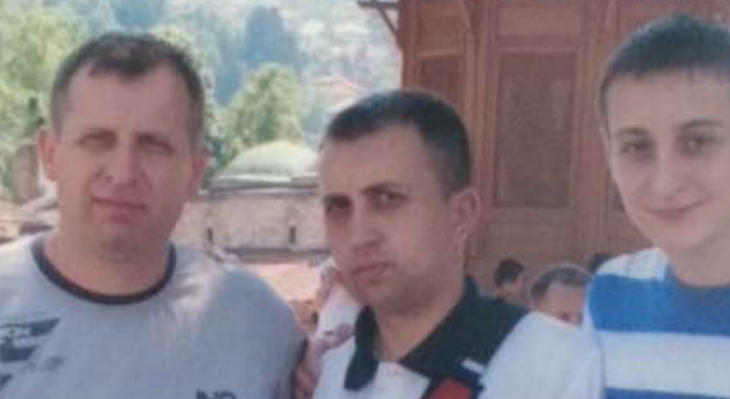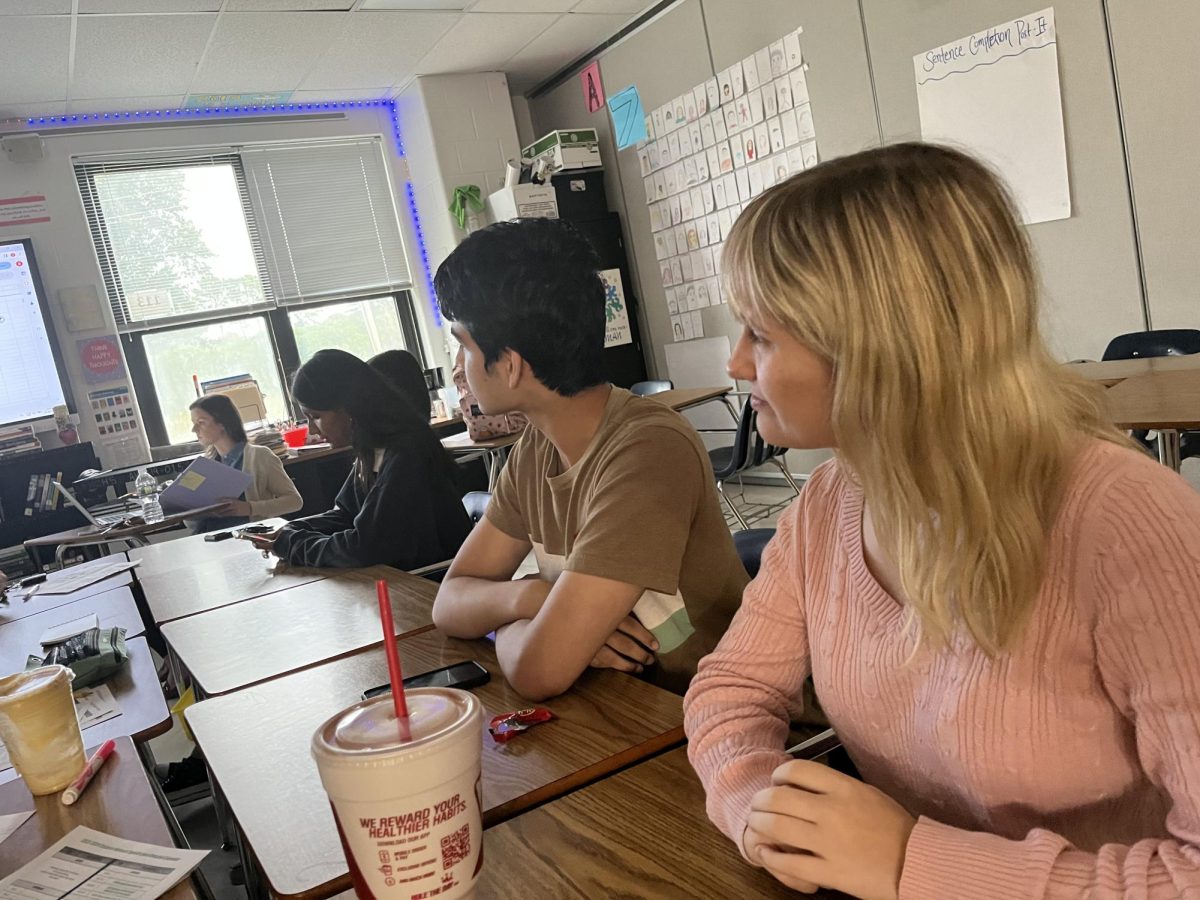Today, in the life of junior Mensur Koso and his family, Mensur works on his homework or participates in extracurricular activities. His sister, Maida, finishes her homework and goes out to play with her friends. His mother, Nermina, stays at home, while his father, Emin, goes to work. On the weekends, the family visits relatives or goes shopping together. But before they migrated to the U.S., Emin and Nermina lived in a war-torn Bosnia and Herzegovina.
with her friends. His mother, Nermina, stays at home, while his father, Emin, goes to work. On the weekends, the family visits relatives or goes shopping together. But before they migrated to the U.S., Emin and Nermina lived in a war-torn Bosnia and Herzegovina.
It’s the early 1990s. Yugoslavia crumbles after the fall of several other communist states across Europe. War rips through the territory of Bosnia and Herzegovina, leaving Sarajevo, the capital of the territory, in flames. Hundreds of thousands of Bosnian people flee the area to come to the U.S., with the Kosos being three of them.
Mensur’s parents were in a dangerous area of Bosnia and Herzegovina during the Bosnian War. They fled the war-torn country after the war to come to the U.S., specifically St. Louis, which, according to Aljazeera America, holds the largest Bosnian population outside of Bosnia and Herzegovina itself. The reason the Kosos fled their homeland was to find better opportunities than what were available in Bosnia and Herzegovina.
“I felt pretty sad,” Nermina said, as Mensur translated. “Yes, there were better opportunities, but I was sad to leave everything I had known my entire life.”
The reason for the break-up of Yugoslavia was mostly because of the ethnic strife, meaning the country broke up because of ethnicities and religions either wanting independence or wanting to take land from another ethnic or religious group. This not only led to the Bosnian War between the Bosnians, Serbians, and Croatians, but it also led to the founding of Bosnia and Herzegovina, Serbia, Croatia, Macedonia, Montenegro, and Slovenia, which also led to many other armed conflicts. It has also led to the current struggle of Kosovo trying to leave Serbia. Another reason for the break-up was the death of Josip Broz Tito, the Yugoslavian dictator, in May 1980. Tito ruled over Yugoslavia from January 1953 until his death.
“That’s the number one reason why it [Yugoslavia] broke up,” Mensur said. “I would say the main reason it broke up was because of all the different people living there. You have to consider Yugoslavia having all these different ethnic groups, Slovenians, Croatians, Nermina lived in Rogatica, a small city in eastern Bosnia and Herzegovina, which is about 40 miles from the Serbian border. She left because the city was extremely unsafe, especially for the Bosnian population. Just outside the small city, in the towns of Karacici, Vragolovo and Golubovici, was where the killings of 20 Bosnian residents, mainly women, children and the elderly, took Bosnians, Serbians, Macedonians, Montenegrins, so on.”
Before migrating to Sarajevo, place at the hands of Serbian forces. Eight of the people responsible were charged with the killings in September of last year.
“[Leaving Rogatica was] very, very dangerous,” Nermina said. “You don’t know if you’re going to end up alive, or if they [the Serbians] were going to catch you and shoot you. Those are some of the things one could never forget.”
Emin is from Sarajevo. He met Nermina in the city, and it is actually where Mensur was born. During the war, Sarajevo was under siege from the Serbians for about three years, which is the longest siege of a capital city in modern warfare, lasting three times as long as the Siege of Stalingrad in World War II.
“[Sarajevo during the war was] terrible,” Emin said. “I remembered shooting, explosions, and unarmed people being targeted. People with masks started shooting at people. It was chaos.” At the start of the war, the Serbians would go door to door, and targeted. It was chaos.”
At the start of the war, the Serbians would go door-to-door, and ask who was in the house. From time to time, they would pull a family from their home, and shoot them. This is how Nermina lost some of her uncles and brothers.
“I was with my nana,” Nermina said. “The aggressors asked who was in the house. That’s when I thought people were going to start being pulled from their houses and were beginning to get killed.”
Before arriving in Sarajevo, Nermina and her group from Rogatica had immigrated to a small town named Goražde, which is about 18 miles from Rogatica. Goražde was a safe zone for Bosinians until it was sieged by the Serbians. She and her group spent a few years there before the city was sieged. The group then left on their 45 mile journey to Sarajevo.
“My group paid very close attention to our guide,” Nermina said. “When we were guided through the terrain, it took us a few days to get from city to city before we reached Sarajevo.”
Nermina and her group first reached Sarajevo about two or three years into the war. When they arrived, they had to go through a tunnel underneath Sarajevo International Airport in order to enter the city. When she entered the city, she was greeted by a pile of rubble.
“Everything was destroyed,” Nermina said. “A lot of buildings had collapsed, there was a lot of destruction.”
Later on during her tenure in Sarajevo, she had to visit her uncle’s second wedding. Her uncle’s first wife had been shot and killed by the Serbians. When she went to congratulate her uncle, she met Emin, who would eventually be her husband.
When the war ended in December 1995, Bosnia and Herzegovina stood as its own country, but the war had taken its toll. Sarajevo was rubble and the whole country was torn apart. Relief efforts were poured into the country to help the rebuilding process. Since the end of the war, Bosnia and Herzegovina has developed into a stronger nation and has rebuilt Sarajevo.
“When the war was over, people couldn’t believe it,” Nermina said. “It was still scary. The Red Cross supplied food and supplies to long lines of people.”
Two years after the war ended, Mensur was born. Knowing that there would be no good job or education opportunities in Bosnia and Herzegovina, Emin and Nermina had to look abroad for opportunities, bring them to the U.S.
“It feels here in the United States you have all these opportunities set in front of you,” Mensur said. “Over there, in Bosnia [and Herzegovina], you might not be recognized as much for your academic abilities, and with a bad economy, you can’t find a job. So if we would have stayed there, I think the amount of opportunities we would have would have decreased.”













![Ninja Christmas [Comic]](https://FHNtoday.com/wp-content/uploads/2024/12/Ninga-Christmas-Comic-1200x898.jpeg)



![Not Most Little Girls’ Dream [Personal Column]](https://FHNtoday.com/wp-content/uploads/2024/11/Copy-of-Mckenna-Hudson-Tales-of-a-child-delinquent-1200x800.png)




